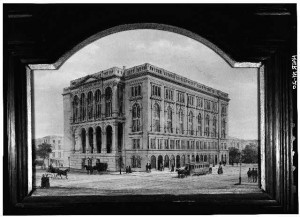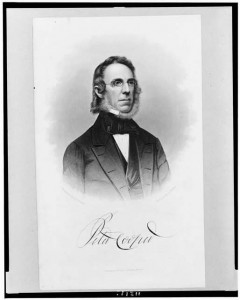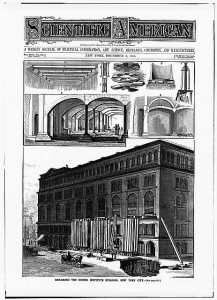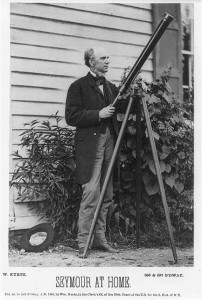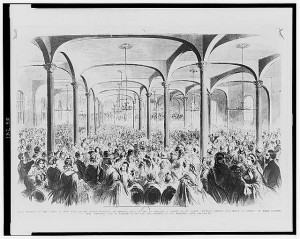During the 1862 election season Democrats in the small town of Seneca Falls, New York formed a McClellan Club. A couple weeks later Democrats in the big town of New York had a big rally. The resolutions adopted by the two meetings were similar. However, the New York City Democrats did not mention General McClellan, but they did argue that the Supreme Court should decide on the constitutionality of the Lincoln administration’s suspension of habeas corpus. They strongly support a war to preserve the Union and the Constitution but not a war to interfere with any existing (peculiar) institutions.
From the Richmond Daily Dispatch October 17, 1862:
Great Democratic meeting in New York.
The New York Herald, of the 14th, has an account of a Democratic mass meeting there the night before, with the following caption:
“The Unterrified in Council — Immense Gathering of the Democracy at the Cooper Institute–The Hall of the Union and the Surrounding Streets Crowded — The New Wide Awakes — Bonfires, Bengola Lights, Torches, Calcium Lights, Rockets and Roman Candles to Brighten the Path of the Union for the Democratic Masses — Speeches of Horace F. Clark, Horatio Seymour, John Van Buren, and Richard O’Gorman.”
The meeting opened with the following incident:
Capt. Rynders read a note from Mr. Peter Cooper, requesting that the audience would abstain from spitting on the seats or carpet. “Knowing you all,” said the Captain, “to be gentlemen who are to be hung shortly, I thought I would make known the request.”
The following resolutions were then read and adopted as the resolutions of the meeting:
Resolved, That as we desire a vigorous prosecution of the present war, the conservative citizens of this city will continue cheerfully the support already given to it, by contributions of men and treasure; but we will at the same time insist on the fulfillment by the present Administration of the solemn pledge almost unanimously given by the Congress of the United States: “That this war is not waged on their part in any spirit of oppression, or for any purpose of overthrowing or interfering with the rights and established institutions of the States, but to defend and maintain the supremacy of the Constitution, and to preserve the Union, with all the dignity, equality, and rights of the several States unimpaired, and that as soon as these objects are accomplished the war ought to cease.”
Resolved, That the investigations by Congress and the State Legislatures have disclosed the existence of fearful and unexampled corruption and extravagance; that unless these enormous frauds be checked the whole country must be involved in bankruptcy and dishonor; that we would be faithless to the principles of honesty and economy in the administration of public affairs if we did not expose and denounce these wrongs on the industry of the great masses of the people, and that, in the language of our friends of New Jersey, we solemnly protest against such reckless extravagance and in famous peculation.
Resolved, That we highly approve of, and cheerfully endorse, the truthful arguments against wholesale emancipation presented by President Lincoln, in his interview with the “Chicago delegation” in the month of September last, satisfied as we are, in the language of the President himself, “that the measure must be necessarily inoperative” and inexpedient, and that “no possible good can result from the issuing of such a proclamation.”
Resolved, That, in the language of the revisers of the statutes of this State, “the writ of habeas corpus is the great bulwark of personal liberty to the citizen;” that of in England it points out to the humblest individual in the realm effectual means as well to release himself, though committed by the king in council, as to punish those who unconstitutionally misuse him, then in this republican country it should at least be as effective to protect an American citizen from arrest upon mere suspicion or of disloyal practices, even by the highest officers in the land; that we hold that the privilege of the writ of habeas corpus can only be suspended by act of Congress, and that the question of the power of the President to suspend it must be decided by the Supreme Court–a decision to which both the President and ourselves must yield.
Resolved, That, faithful to our own record, we renew our vows of loyalty to the Union and the Constitution, and stand now, as ever, supporting the strong arm of the Government as the only breakwater between the constitutional rights of the people of the United States and the rising flood of overwhelming force and lawlessness.
Resolved, That in the nomination of Seymour and Wadsworth by the respective parties of the State, the line is distinctly and clearly drawn between those who believe in the Constitution as it is and the Union as it was, and the men who seek to establish in their stead a new Constitution and a new Union.
Resolved, That we recommend to the electors of this State the ticket nominated at Albany, on the ground that its election will tend to check extravagance and corruption in public officers, give new vigor to the prosecution of the war, and assure the people that the Union and the Constitution for which our fathers made sacrifices still live in all their original vigor.
Gov. Seymour, the candidate for Governor, made a speech tallying with the resolutions, in which he announced that, if the Supreme Court approved Lincoln’s proclamations, the people would submit to them; if it did not, they would not submit. …
Peter Cooper (1791-1883) “was an American industrialist, inventor, philanthropist, and candidate for President of the United States.” He designed and built Tom Thumb, an early American steam locomotive. He founded Cooper Union in 1859. Lincoln’s speech there in February, 1860 is considered a stepping stone toward his election as U.S. president.

